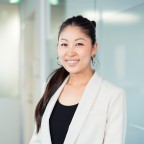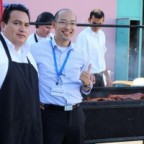Professor Yuko Otsuka is an associate professor in the Department of English Studies at Sophia University, specializing in linguistics, Tongan, and Polynesian Languages. She was born and raised in Japan and graduated from International Christian University where she studied teaching Japanese as a foreign language. In her third year of university she joined the Japan Overseas Cooperation Volunteers and spent two years in Tonga teaching Japanese. It was that experience that inspired her future career in academics. After returning from Tonga, she taught Japanese at a language school in Japan and then decided to go to graduate school. She attended Oxford University where she earned her M.Phil. and D.Phil. in General Linguistics. Recently she sat down with the editor of our student journal Angles to discuss her background, her career and her teaching philosophy.
Angles Editors: Originally you studied to be a Japanese language teacher. Why did you shift to linguistics?
 Professor Otsuka: That was by accident. I really enjoyed living in Tonga and I wanted to go back there, but I wanted to work for the Ministry of Education in Tonga, so I thought having a master’s degree would help, so I decided to go to graduate school in Oxford. Then my professor at graduate school was really fascinated by the fact there is a Japanese girl who speaks Tongan. There aren’t many people who speak Tongan other than Tongan people and there aren’t any Tongan linguists doing this sort of work. My supervisor suggested that I analyze Tongan using this theory because no one else has ever done that before. I wasn’t planning to do a Ph.D, but at the end of the master’s course, my professor asked when I was going to do a Ph.D. I wasn’t sure, but I also thought that if I went to teach at a university I could also bring jobs to Tonga which might be a better contribution, and that’s how I made the switch from teaching Japanese to linguistics.
Professor Otsuka: That was by accident. I really enjoyed living in Tonga and I wanted to go back there, but I wanted to work for the Ministry of Education in Tonga, so I thought having a master’s degree would help, so I decided to go to graduate school in Oxford. Then my professor at graduate school was really fascinated by the fact there is a Japanese girl who speaks Tongan. There aren’t many people who speak Tongan other than Tongan people and there aren’t any Tongan linguists doing this sort of work. My supervisor suggested that I analyze Tongan using this theory because no one else has ever done that before. I wasn’t planning to do a Ph.D, but at the end of the master’s course, my professor asked when I was going to do a Ph.D. I wasn’t sure, but I also thought that if I went to teach at a university I could also bring jobs to Tonga which might be a better contribution, and that’s how I made the switch from teaching Japanese to linguistics.
Professor Otsuka specializes in formal syntax and theoretical linguistics. “I use a very formal approach, a theory called generative grammar, a theory that was invented or proposed by Noam Chomsky.” After leaving Oxford, Professor Otsuka moved to Hawai’i where she took a position teaching linguistics. She taught there for sixteen years before making a change and coming to Sophia University in the Fall of 2016.
Angles Editors: You went to ICU for university. Can you tell us about your life as a student and some of the courses that interested you while you were there?
Professor Otsuka: When I went to ICU it was quite different. It was a very unique, small school. The classes I really remember learning something was when I was able to do research papers. I even took introduction to law and we were able to choose any topic. One day, I was wandering in the library and I found a story about children with no nationality in Okinawa. It’s about the nationality law. Basically in the U.S. system, if you were born in the states you get citizenship and on the other hand in Japan if your father is Japanese then you get citizenship, no matter where you were born. But in Okinawa there were many kids that were born between Japanese moms and U.S. soldiers. Technically they were born on non-U.S. soil and their fathers were not Japanese so they didn’t get any citizenship anywhere, so they were stuck. Then they changed the law in Japan so that you get citizenship through the mother’s blood line as well. That was really fascinating. You can learn something and it will stick with you. So, I like those kind of classes rather than you can get an ‘A’ if you memorize and pass the exam.
Angles Editors: Would you say that similar the kind of classes you like to teach?
Professor Otsuka: Yes, the classes I teach are like that. I want my students to think and be able to express their ideas. I want them to remember and not memorize. I have a six-year old daughter and the other day she was very frustrated with this math exam. And she asked “Why do we have to study?” She wants to get it right. And I said, “The reason why we go to school is to practice thinking.” The goal is not to get it right, but to get used to the idea of thinking. I think at the university level that’s even more important. The goal is not to get an ‘A+’, the goal is to cultivate your thinking ability.
Angles Editors: Before you went to ICU did you have experience learning English at a high level? Personally, I think it’s very difficult to learn a language at university.
Professor Otsuka: I didn’t have any overseas experience until I went to Tonga and Tonga isn’t even an English-speaking country. I started to study English just like any other Japanese middle school at the age of thirteen, but I really liked it. To me it’s like decoding a mystery. I really liked to use the language to communicate with people.
To read more of Professor Otsuka’s conversation with our Angles editors, please check out the second part of the interview where Pofessor Otsuka discusses her advice for students, especially those studying English, and topics and writing of interest in her field.


















